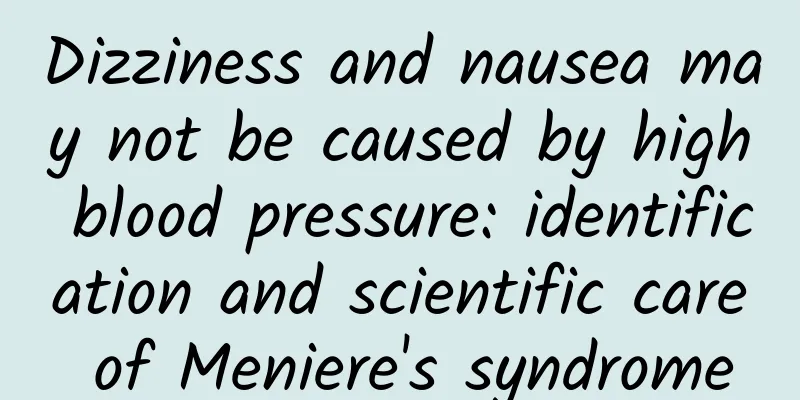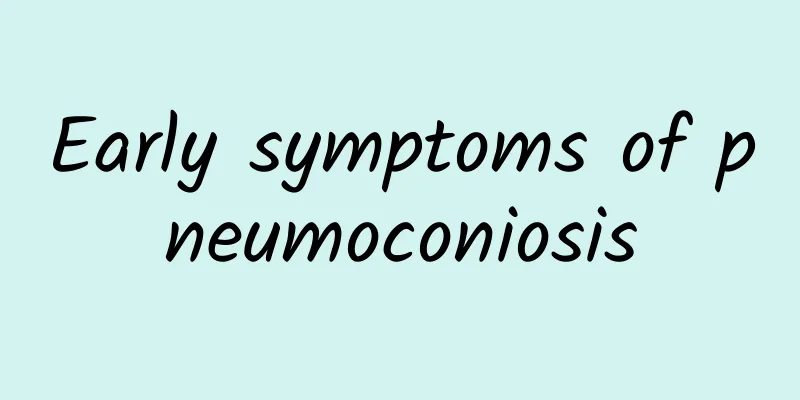Dizziness and nausea may not be caused by high blood pressure: identification and scientific care of Meniere's syndrome

|
Ms. Zhang, 45, has been experiencing frequent dizziness, nausea, vomiting and tinnitus in the past six months. At first, she thought it was a high blood pressure attack, and she took antihypertensive drugs on her own, but it did not improve. It was not until she went to the doctor for a checkup that she was diagnosed with Meniere's syndrome. This disease, characterized by repeated dizziness and hearing fluctuations, is often mistaken for hypertension or cervical spondylosis. This article will give you a comprehensive understanding of this disease and focus on analyzing the scientific nursing knowledge that patients and their families need to master. 1. Meniere's syndrome: "flood" in the inner ear Meniere's syndrome is an inner ear disease, the main pathological mechanism of which is hydrops in the membranous labyrinth. The circulation of lymphatic fluid in the inner ear is unbalanced, resulting in abnormal pressure and causing the following typical symptoms: - Sudden vertigo: feeling of spinning or spinning around, lasting from 20 minutes to several hours; - Fluctuating hearing loss: In the early stage, low-frequency hearing loss is the main cause and is often ignored; - Tinnitus and ear fullness: aggravated during attacks and possibly relieved during remissions; - Nausea and vomiting: may occur with dizziness and may lead to dehydration in severe cases. The difference between dizziness caused by hypertension: dizziness caused by hypertension is often manifested as a heavy head, light feet, and headache, and a significantly increased blood pressure monitoring value; while the dizziness caused by Meniere's syndrome has a stronger "spinning feeling" and is often accompanied by ear symptoms. 2. Acute attack care: safety first, symptom relief 1. Fall protection During a vertigo attack, the patient's balance ability is extremely poor, so they need to sit down or lie down immediately and avoid standing activities. Family members should remove sharp objects around them and use bed rails when necessary. When an attack occurs in a public place, you can lean against the wall and sit down slowly to avoid secondary injuries such as fractures caused by falling. 2. Environment and body position management Turn off strong light sources, keep the environment quiet, and reduce sound and light stimulation. A semi-recumbent position (head raised 30°) can help relieve inner ear pressure. Avoid sudden head turns or changes in body position. 3. Symptom relief techniques - Instruct patients to close their eyes and fix their sight to reduce visual distractions; - Use vestibular suppressants (such as diazepam) and antiemetic drugs as prescribed by your doctor, but be aware that such drugs should not be used long-term. III. Life management during remission: preventing relapse is the key 1. Low-salt diet control Daily salt intake should be limited to less than 3 grams. Avoid pickled foods, processed meats (such as ham, sausage), soy sauce and other high-sodium foods. It is recommended to use a quantitative salt spoon and replace part of the salt with natural spices when cooking. 2. Moisture and irritant management Keep drinking water regularly, but avoid drinking large amounts of water at one time (no more than 200 ml per hour is recommended). Limit caffeine (coffee, strong tea) and alcohol intake, as they may aggravate inner ear edema. 3. Stress and sleep regulation Anxiety and fatigue are common triggers. It is recommended to relieve stress through mindfulness meditation and progressive muscle relaxation training. Establish a regular work and rest schedule, ensure 7 hours of sleep, and the lunch break should not exceed 30 minutes. IV. Long-term rehabilitation support: multi-dimensional intervention 1. Vestibular rehabilitation training Personalized vestibular exercises under the guidance of a doctor, such as the Brandt-Daroff exercise (repeated sitting-side-lying movements), can promote the brain's compensatory adaptation to balance signals and reduce the frequency of vertigo recurrence. 2. Hearing monitoring and protection Perform pure tone audiometry every 3-6 months to monitor hearing changes. Avoid long-term exposure to noise and use noise-reducing earplugs when necessary. 3. Psychological support system About 30% of patients develop anxiety or depression. Family members should pay attention to mood changes and encourage patients to participate in support groups. Cognitive behavioral therapy (CBT) can help adjust incorrect perceptions of the disease. 5. Precautions for medical treatment and medication - If an acute attack lasts for more than 24 hours or unilateral hearing loss worsens, you need to seek medical attention immediately to rule out diseases such as stroke or acoustic neuroma. - Patients taking long-term medications need to have their liver and kidney function checked regularly, and potassium supplements are required when using diuretics (such as hydrochlorothiazide). - Surgical treatment (such as endolymphatic sac decompression) is suitable for critically ill patients who are not effectively controlled by drugs, and the indications need to be strictly evaluated. Although Meniere's syndrome cannot be cured, most patients can effectively control symptoms through scientific care and standardized treatment. Patients need to establish a "disease diary" to record the cause of the attack, duration and medication reaction, providing a basis for personalized treatment. Remember: correct identification, early intervention and systematic management are the key to breaking the vicious cycle of vertigo. Reminder: If you or a family member experiences repeated vertigo accompanied by hearing changes, please go to the ENT department for a vestibular function test and hearing assessment in time. Do not diagnose yourself as having high blood pressure or blindly take anti-vertigo drugs. Statement: This article is a medical-related educational popular science article. It does not involve specific treatment methods or medical behaviors and cannot replace hospital visits. About the Author: Zhao Jiaojiao, female, head nurse, China Science Popularization Expert, member of the Nursing Branch of the Chinese Stroke Society, member of the Chinese Rural Health Association, member of the Nursing Branch of the Shandong Stroke Society, member of the Shandong Nursing Society, member of the Shandong Science Popularization Volunteer Association. Graduated from Taishan Medical College with a bachelor's degree in nursing; since 2007, worked in the Affiliated Hospital of Taishan Medical College (later renamed the Second Affiliated Hospital of Shandong First Medical University), successively worked in the emergency department, neurosurgery, critical care medicine, and emergency critical care medicine II. Has been engaged in emergency and critical care nursing research for a long time. |
<<: The Secret of Growth Hormone: From Childhood Growth to Anti-Aging
Recommend
Can I eat winter melon when I am pregnant?
It is best for pregnant women not to eat winter m...
What is the meaning of useless feelings? How to deal with useless feelings
How to describe a useless relationship? It means ...
Is it OK to eat hot pot while losing weight? What are the precautions for eating hot pot?
When eating hot pot, people often pursue tenderne...
What is the difference between fetal anomaly screening and four-dimensional color Doppler ultrasound?
When it comes to the two terms "four-dimensi...
Why do women want to pee when lying down?
Both men and women may experience increased urina...
How do women add estrogen?
How should we treat women when they have symptoms...
Female urethra burning
The urethra is an indispensable part of our body....
Do birth control pills delay my period?
Contraceptive pills are a type of drug that achie...
Can I drink milk tea during menstruation?
Milk tea shops do have some harm, but many women ...
Can I eat lychees when I have my period?
In fact, people need to pay special attention to ...
How to treat complicated candidal vaginitis?
Girls are the most beautiful and most lovable gro...
Is low blood pressure as harmful as high blood pressure? 3 tips to help you raise your blood pressure
When it comes to blood pressure, people generally...
What are some tips for preventing gynecological diseases?
Gynecological diseases are diseases that specific...
What medicine should women take to supplement estrogen
Medical research has found that the fineness and ...
Callicarpa nudiflora dispersible tablets for gynecological treatment
The main ingredient of Callicarpa nudiflora table...









